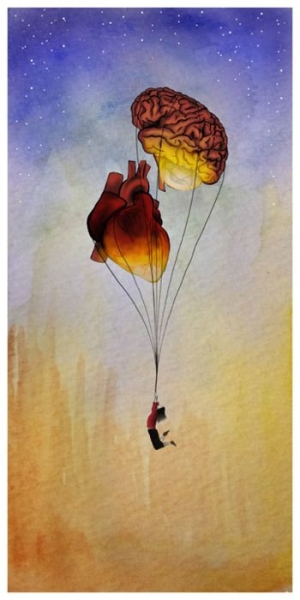
Intention plays a huge part. If you’re using chemicals to escape reality then I think that hinders your practice. If you’re using these chemicals therapeutically to treat symptoms of illness (physical, mental, emotional, whatever) how can I tell you to stop and just suffer?
By David Jones
I had a diabetes eye exam the other day.
Everything went okay, but my eye pressure was a little high. Taken along with some other factors, it all seems suspicious, so in a few months they want me to come back for a glaucoma screening. Of course, I’m a ‘70s kid, so as soon as I heard “glaucoma treatment” I thought “Hmmm.”
My wife said, “At least you don’t have to smoke it anymore.” True true.
But despite being a fairly liberal guy and having kids who are quite familiar with marijuana (one daughter worked at a dispensary), I still have this bug about it. As a kid I internalized everything we were told about all these dangers in life and that’s hard to shake.
I’m working on it.
Mom and dad were both serious alcoholics so I don’t touch any alcohol, I’ve never tried smoking anything and I’m not interested in getting high or having hallucinations. LSD scares me. But what about other psychoactives?
Like, I have caffeine in my diet, but the coffee-drinking adults didn’t warn us kids about that chemical, did they?
It could have significant effects on my body and mind, but it was fine. But if I took one puff of weed, I’d be mainlining heroin for lunch and turning tricks for cash on Prospect Avenue by nightfall.
These psychoactive substances keep popping up in videos and articles about spiritual experiences and insights. Mushrooms, peyote, DMT, mescaline—all these chemicals promising quicker and deeper spiritual experiences. That sounds really appealing. But there’s another factor at play: my vow to refrain from intoxicants.
Here’s the thing: there isn’t just one view of how to understand and pursue this vow. I’ve haunted Buddhist chats online, watched umpteen videos, and read articles discussing it.
Views are pretty mixed and include:
I love my experiences with _________.
Eh, it’s no big deal.
No! It violates the clear teachings of the Buddha!
It really only applies to alcohol.
It isn’t just about intoxicating substances but also intoxicating ideas like religion.
Drugs of any sort should be avoided because people abuse them and they lead to addiction.
I’m recovering from addiction so I think everyone should take the instruction against intoxicants more seriously than they do.
They helped me clear away my spiritual roadblocks and I finally felt at one with everyone and everything.
They’re a cheap short-cut to overcoming ego and finally awakening, which isn’t as valuable as putting in the hard work to achieve these things.
If you use these substances then you can’t call yourself a Buddhist!
So what have I concluded? Well, like everything else, it’s complicated (even if some folks insist it isn’t).
I think intoxicants could impede one’s efforts to maintain all of the precepts, leaving folks more prone to selfish attitudes and impulsive actions. (“My getting a buzz doesn’t affect you. It’s my life, not yours. If you don’t like these things, then just don’t do them.”)
In terms of Interbeing, one person’s private decision does in some ways affect us all, but not everyone acknowledges that connection. Also, if one is prone to addiction or is in recovery, then avoiding intoxicants entirely might be the best choice for them.
If someone wants to use chemicals like a warp zone to enlightenment and greater awareness of our interconnected relationship with nature and each other, I don’t have a problem with that. If it’s a genuine experience and has positive results, then I’m not going to complain. Native cultures have been using them since before Gautama and Jesus were born and can be sacred elements of their culture and practice.
Who am I to decide what folks are allowed to do?
Intention plays a huge part. If you’re using chemicals to escape reality then I think that hinders your practice. If you’re using these chemicals therapeutically to treat symptoms of illness (physical, mental, emotional, whatever) how can I tell you to stop and just suffer? I know folks who’ve struggled through cancer and needed those powerful chemicals just to make it through, even if others found other means to handle the pain.
Plus, I’m already technically violating the vow because I take a prescription opioid to handle my Restless Limb Syndrome symptoms and allow me to sleep. I only take one tablet every two or three days for the most part, and it’s the only thing that my doctor and I have found that really works for me. I don’t seem to get all buzzy, and any cognitive or reflex impact seems minimal or non-existent according to my wife. My intention isn’t to use it for kicks or anything irresponsible. It just helps in ways meditation and concerted effort haven’t.
So is it just up to me to figure it out for myself? Yes! It is, always has been, and always will be up to each person to walk their path with their own two feet, so to speak.
I honor the Dharma, but I’m not its gatekeeper.
I can’t judge others by my understanding. All I can do is my best at refraining from intoxicants that hinder me, and just get on with life. I’m pretty sure Buddha, Jesus, and God aren’t mad at me over this, and I trust folks won’t be stumbled over my understanding.
Be well.
Did you love this piece? Tip the author! Help support writers: paypal/donate
Were you inspired by this? You may also like:
The Fifth Precept: Meditation is Not About Getting High (and Why I Don’t)
Comments
- 3 Thoughts for Metta Beyond the Cushion - May 9, 2024
- Intoxicants and Intentions - April 29, 2024
- Mindful Appreciation of Wild Beauty - April 16, 2024




